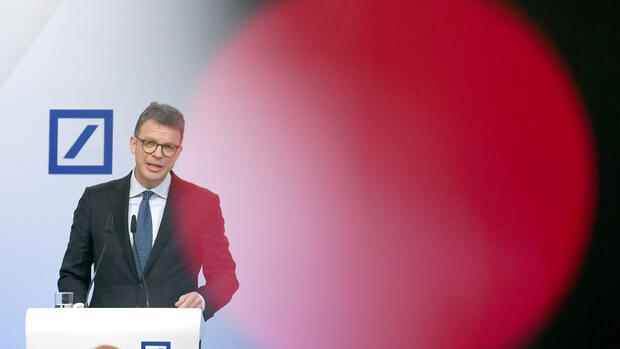Frankfurt For months, Deutsche Bank has been working on its new strategy and playing through growth options in an environment of higher interest rates. But when Christian Sewing presents the new milestones to investors on Thursday, the Ukraine war will overshadow everything – the prospects for the global economy are too uncertain. “Due to the war in Ukraine and its consequences, all plans can be wasted because a global recession is now also possible that will affect the bank’s customers,” says Andreas Thomae, fund manager at Deka Investment.
The concerns of investors are already reflected in the share price: Like many other financial stocks, Deutsche Bank has also slipped on the stock exchange, the share price has fallen from around 14 euros to around nine euros since mid-February.
Other industry experts also assume that the bank will at least make its new targets with reservations given the uncertainties caused by the war. It is considered unlikely that the institute will be able to fully incorporate the possible economic effects of the Ukraine war into its forecasts.
In the past three years, Sewing has been mainly involved in the renovation of Germany’s largest bank, the motto was saving. In doing so, he has made good progress, as even critics say.
Top jobs of the day
Find the best jobs now and
be notified by email.
But analysts doubt whether all goals will really be achieved by the end of 2022: by the end of the year, Deutsche Bank wanted to achieve an after-tax return of eight percent on tangible equity and a cost-income ratio of no more than 70 percent. The index indicates how many cents a bank has to spend to earn one euro. Analysts trust the institute with a return of only six percent and an expense ratio of 74.5 percent.
On Thursday there could now be an update on the previous goals; but above all it is about the next three years until 2025 and the question of how much ambition Sewing is showing. The research house Autonomous has so far assumed that Deutsche Bank will increase its return targets from eight percent for 2022 to twelve percent for 2025.
Autonomous founder Stuart Graham estimates that the bank should aim for the 65 percent mark for the expense ratio, i.e. 65 cents per euro. However, the Autonomous report dates from early February, before the outbreak of war.
>> Read here: Deutsche Bank wants to pay dividends again and buy back shares
Deka fund manager Thomae’s expectations for the bank are less ambitious: “I assume that Deutsche Bank will set a return target of nine percent by 2025. The institute cannot promise more with conservative calculations,” he says. He also expects the bank to name a “specific range” of how much the expense ratio is below 70 percent.
Thomae believes the bank can achieve annual earnings growth of three to four percent. “This should primarily be due to higher income from the private and corporate customer division and growth in line with the market in the investment bank.” On the other hand, some burdens will no longer apply, such as contributions to the EU resolution fund from 2024, as well as the costs for the bank’s resolution division as soon as these will be finally dissolved.
IT costs are also likely to fall as soon as the separate Postbank IT is switched off by Deutsche Bank. “That should enable further cost reductions of around one billion euros,” says the Deka man.
Evolution instead of revolution
Nobody currently expects significant strategic shifts. The wording on the official agenda already speaks against a revolutionary change in strategy: CEO Sewing wants to talk about the “strategic evolution” of the institute by 2025.
There will be no drastic changes to the business model, and larger personal details are not on the agenda, according to financial circles. Rather, it is about showing where the bank sees growth opportunities in the coming years and how shareholders can benefit from them. In addition to a new return target, people familiar with the plans are also expecting details on the future dividend policy and possible share buyback programs.
So far, the bank has not commented on the form in which – and how quickly – the bank intends to fulfill its promise made in 2019 to pay out a total of five billion euros to its shareholders in the form of dividends or share buybacks. So far, the bank has only announced that it will pay a dividend of 20 cents per share for the past financial year and that it intends to buy back shares worth 300 million euros in the first half of the year.
Autonomous analyst Graham estimates that the dividend for the current fiscal year will be twice as high at 40 cents. Autonomous expects the bank to promise shareholders it will pay out around 15 billion euros by 2025. In his opinion, the focus should be on share buybacks. According to this forecast, the institute will raise around 65 percent of the net profit for the shareholders. Deka Investments, on the other hand, only assumes a payout ratio of 40 to 50 percent of net profit.
In a European comparison, Deutsche Bank is under pressure on this issue: After the expiry of the ban on dividends imposed by the European Central Bank (ECB), the bank supervisors, large European institutions promised their shareholders generous dividends. The major Italian bank Unicredit, for example, announced in December that it intends to pay out 16 billion euros to its shareholders in the form of buybacks and dividends over the next few years.
More: “Times are getting much worse” – Europe’s banks fear expropriations in Russia
